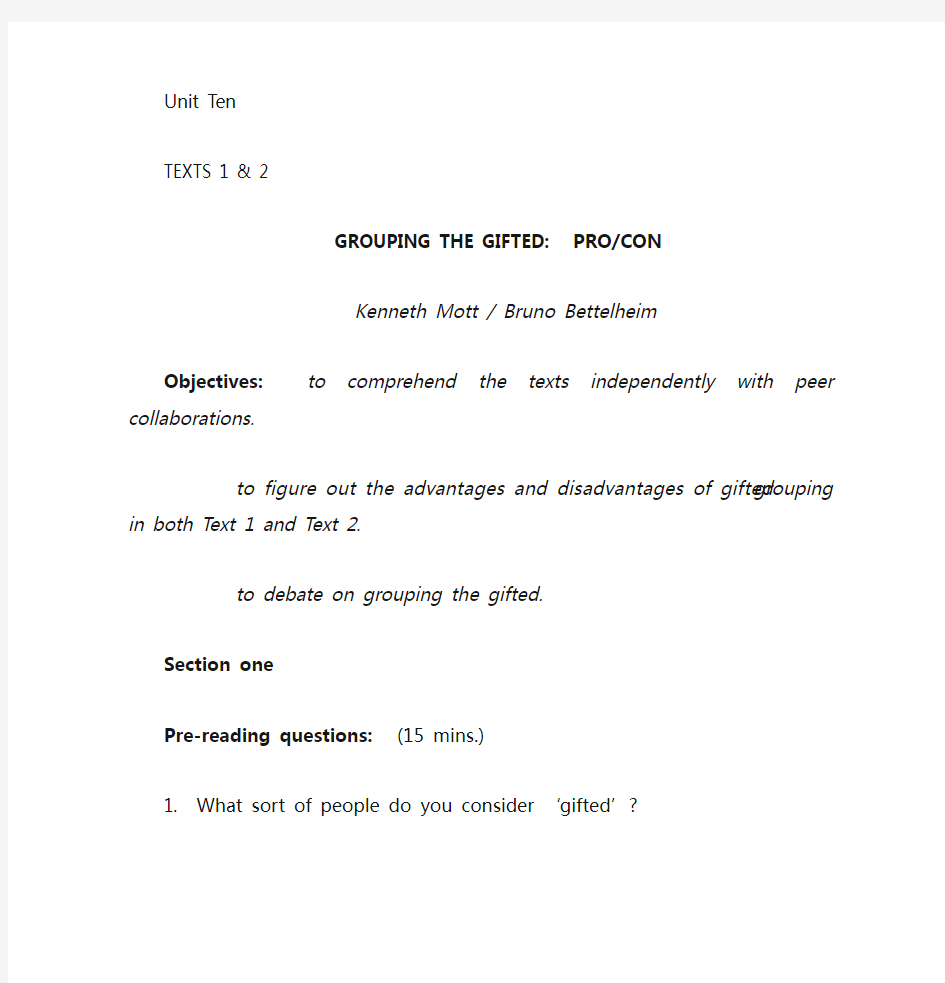新编英语教程5Unit7教案

- 1、下载文档前请自行甄别文档内容的完整性,平台不提供额外的编辑、内容补充、找答案等附加服务。
- 2、"仅部分预览"的文档,不可在线预览部分如存在完整性等问题,可反馈申请退款(可完整预览的文档不适用该条件!)。
- 3、如文档侵犯您的权益,请联系客服反馈,我们会尽快为您处理(人工客服工作时间:9:00-18:30)。
Unit Ten
TEXTS 1 & 2
GROUPING THE GIFTED: PRO/CON
Kenneth Mott / Bruno Bettelheim
Objectives: to comprehend the texts independently with peer collaborations.
to figure out the advantages and disadvantages of gifted grouping in both Text 1 and Text 2.
to debate on grouping the gifted.
Section one
Pre-reading questions: (15 mins.)
1. What sort of people do you consider ‘gifted’?
2. What do you know about IQ and IQ scores?
(See Lib. Work)
3. Do you think gifted children should be treated differently from children at large? Give your reasons. i.e. Do you agree with Kenneth Mott that the ‘gifted’ should be grouped?
In-reading:
Step 1. Answer the questions given by individual work or peer collaboration.
Read this passage carefully this time and answer the following questions by figuring out the sentences in the text and interpreting them in your own words in written work: (40 mins.)
1) What does Mott define ‘the gifted’? How is his definition different from the commonly held one? Do you think this is important? In what way is this relevant to his argument? (comp.3-1, O &D1) (paras.1, 2)
2) What does Mott think of the way to deal with the gifted? (paras.3, 4)
3) What opposing views does Mott single out for refutation? How does he defend his ideas? (O&D2) (paras.5 - 13 )
4) Are there any advantages and disadvantages of heterogeneous classes talked about? If any, what are they? (paras. 14, 15)
6) How does the experiment in reading program go and what’s the result? (paras.16, 17, 18, 19)
7) How does Mott conclude his argument? Do you think this is a good way to conclude? Why or why not? (O&D3)
(This is actually the preparation of the text in class so that the teacher can see how well the students can do the job individually and independently.)
Step 2: Class discussion on the questions given above. (25 mins.)
1. Definition of the ‘gifted’.
1.1. What does Mott define ‘the gifted’? (comp.3-1, O &D1) (paras.1, 2)
According to Mott, the gifted are those who possess some quality or innate ability which has been recognized and identified by any number of testing and observation devices and who manifest interest and success in either physical, intellectual, or artistic pursuits. (Split and paraphrase the sentence) (LW5-1, 6-1)
(Splitting 1: In my opinion, gifted children usually possess some special quality or innate ability which has been made known and verified by means of testing and observation devices. Moreover, gifted children show interest and achieve success in either physical, intellectual, or artistic pursuits.)
Paraphrasing: In my opinion, gifted children are children who are specially endowed with natural abilities which rank high on testing scales.
These might be children who are gifted athletes but who have real trouble mastering academic subject matter, or students who are poor athletes but are highly intellectual ‘quiz kids’ who knock the top off all measuring devices. (Split the sentence) (LW5-2) Splitting 2: These children might be gifted athletes but rather poor academically. Or, they might be poor athletes but very strong intellectually.
Gifted may describe pupils of average intelligence who have exceptional ability in art or music, or it may refer to the child with an IQ of 135 who excels in everything.
Some gifted, though they are not specially intelligent, have special ability in art or music; some have an IQ score as high as 135 indicating they are very superior in everything.
(The splitting and paraphrasing exercises are done only when the students have difficulty in understanding these sentences demonstrated in their answers. Or the keys to the exercises can be used by the teacher in his sum-up of the students’ answers.)
1.2. How is his definition different from the commonly held one?
The notion of the gifted is normally associated with a high level of intelligence, but Mott’s definition emphasizes interest and ability as well as intelligence.
1.3. Do you think this is important? In what way is this relevant to his argument?
Mott begins his essay by making clear what he means by the gifted. This is definitely important. Mott’s argument is to a large extent based on the definition of the gifted. Whether grouping the gifted can yield positive results has Much to do with what the gifted is taken to mean. Note the 1st sentence of para.6.
2. What does Mott think of the way to deal with the gifted? (paras.3, 4)
I firmly believe that we should group them as nearly as possible according to interest and ability (giftedness) and challenge them with a type of program that will help them to grow to the fullest extent of their abilities and capacities. (paraphrase) (LW6-2)
